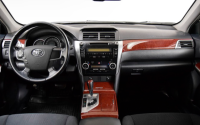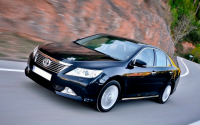"The suspension is shot through. Is it supposed to be like that, or was it a defect?", wrote the owner of a new Camry on one of the thematic forums. The mileage of the car is only 1,900 km, and the driver has already regretted that he bought it instead of the Camry 50. He used the previous model for six years and had no problems with the running gear during that time. On a motorway the car confidently held the road, didn't wobble and didn't "break" on bumps. How else the old version of Camry is superior to the new one, we tell in this article.
Why was the old Toyota Camry XV50 loved?

Toyota Camry XV50 was loved for its reliability, comfort and liquidity. Toyota in general, and the Camry in particular, is a rare kind of car as an investment rather than a waste of money. Buying a super-popular sedan, you know that you're guaranteed to get a good sum for it at secondary market, and you won't "get" serious money in the course of car ownership.
Hundreds and hundreds thousand kilometres of Camry will run with regular performance of maintenance service. By the way, it advantageously distinguishes XV50 from its predecessor XV40 which reputation has been spoiled by automatic transmission which has not kept power of the engine, and problems with coloring of early copies. It is about reliability.

As for comfort, the lulling softness, exemplary soundproofing, and tricked-out rear sofa (with climate and media controls) have made this car a favorite of regional officials, taxi drivers, and average users.
The XV50's successor, the Camry XV70, has taken a few steps forward and even more sideways. Not in reliability and liquidity, but in running performance.
Also read: Middle or business class: Toyota Camry (XV40) review
What's new in the new Toyota Camry?

Everything: the running gear, the 3.5-litre engine, the 8-speed automatic, the media system. Camry XV70 differs from its predecessors more radically than, say, XV50 from XV40. First, Camry has moved to a global platform TNGA (Toyota New Global Architecture) - a sort of a construction set, a set of unified solutions, "cubes" from which other automobiles of concern are made. For example, last Prius and compact crossover СН-R.
Besides that the chassis is structurally new and different from predecessors, it is also tuned on other principle. To all appearances, Toyota has tired to listen to complaints of profile press about "dullness" of its cars and absence of any significant driving notes in behaviour and has radically changed character of the car. Perhaps, for the first time in its history, Camry is adjusted so that it is interesting to drive.
It's certainly still no bmw driving pleasure or even the sharpness and sharpness of the latest Mazda 6, but nevertheless. Against the background of its predecessors, the Camry XV70 feels like a very driveable sedan: dense, firmly bunched, bouncy, at times whipping.
Also read: What to choose: Mazda 6 or Toyota Camry
Old-timers are outraged

Instead of habitual loose, soft, lulling granny sofa they were given practically European business sedan, where the slider of balance "comfort/steering" is appreciably moved towards steering. So, yes, the new Camry behaves not still on former routes. What it used to flatten out, it now takes seriously; the bumps, which it did not notice, began to scrutinize.
Not everybody has appreciated it, not everybody is happy. Someone has made a decision to stay on their XV50 for some time. But Toyota has essentially widened its audience: those who wouldn't even look at a "pensioner" Camry before, now impatiently queue up to trade in the already mentioned Mazda 6 (there was a real case in Yekaterinburg and I think not one).
An experiment? Yes. Is it a risk for Toyota? Absolutely. Right or wrong, there is only one objective answer - the sales figures, and they are more than satisfactory. At the end of seven months of 2019, the Toyota Camry XV70 closes the top 10 best-selling cars in the country and its sales are growing in double digits (+11% over the same period in 2018, according to AEB). Not a bad result for a car with a price tag of more than 31 000 USD, would you agree? Apparently, the increased suspension stiffness customers are willing to tolerate or simply don't notice.
Also read: Business class eternal dispute: Nissan Teana or Toyota Camry
And what will happen to secondary sales?

Nothing new or original: the Camry will be in short supply. The "Japanese" holds second place behind the Ford Focus in terms of the number of checks via avtocod.ru. In the seven months of 2019, the service issued 211,473 reports on it. The new Camry loses more in resale value than its predecessor. The XV50 gets cheaper by an average of 7% a year, the XV70 by 11%.
But here we should understand that there are not enough data on XV70. The car has been on the market for only a year, and some objective picture about its behavior on the secondary market will be formed not soon. Most likely, its decrease in price will become equal to XV50, and probably even lower.
Again, look at the demand for new cars. The Camry is adding to the overall sales stagnation. Its popularity is unlikely to be threatened over the years.


-rear-and-front-view-camera-6.png)

